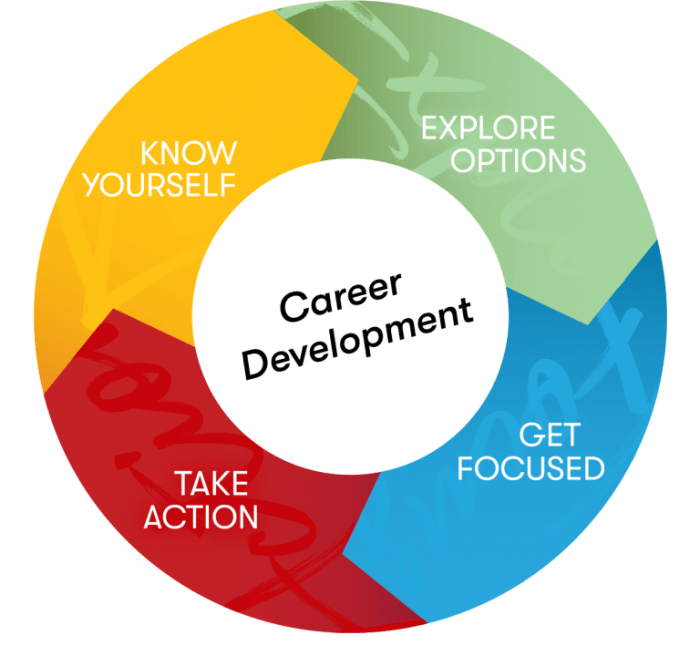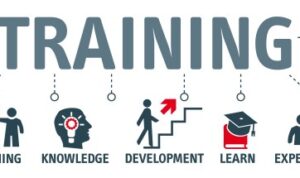Career Growth Strategies: Let’s dive into the essential strategies that can propel your career forward, from skill development to overcoming challenges, all in a cool and engaging style that speaks to high school vibes.
Ready to unlock the secrets to long-term success in your career? This guide has got you covered with insights and tips on how to navigate the professional world like a boss.
Importance of Career Growth Strategies

Having a clear career growth strategy is essential for professional development as it helps individuals set goals, identify opportunities for advancement, and stay focused on their long-term career objectives.
Example of Effective Career Growth Strategies
- Networking: Building relationships with professionals in your field can lead to new opportunities, mentorship, and valuable connections.
- Continuous Learning: Investing in skills development through courses, workshops, and certifications can enhance your expertise and marketability.
- Setting Clear Goals: Establishing specific, achievable goals helps you track progress and stay motivated towards your desired career path.
Long-Term Benefits of Planning Career Growth Strategies
- Increased Job Satisfaction: Knowing that you are working towards your career goals can boost morale and overall satisfaction in your work.
- Opportunities for Advancement: With a strategic plan in place, you are more likely to be considered for promotions and leadership roles within your organization.
- Financial Stability: Advancing in your career can lead to higher salaries, bonuses, and other financial rewards, providing long-term stability and security.
Types of Career Growth Strategies
In the professional world, there are various strategies individuals can employ to advance in their careers. These strategies are crucial for personal development and achieving long-term career goals.
Skill Development
Skill development is a key aspect of career growth. This involves continuously improving and acquiring new skills that are relevant to your field. Professionals who invest in learning new technologies, tools, or techniques often have a competitive edge in the job market. For example, a software engineer who consistently learns new programming languages or a marketer who stays updated on the latest digital marketing trends are more likely to progress in their careers.
Networking
Networking plays a crucial role in career growth. Building relationships with professionals in your industry can open up new opportunities for career advancement. Attending industry events, joining professional organizations, and connecting with influencers on platforms like LinkedIn are effective networking strategies. Successful professionals often attribute their career growth to the relationships they have built over time.
Goal Setting
Goal setting is another important career growth strategy. By setting clear and achievable goals, individuals can stay focused and motivated to progress in their careers. Short-term goals help in immediate career advancement, while long-term goals provide a roadmap for future success. Professionals who set specific, measurable, achievable, relevant, and time-bound (SMART) goals are more likely to achieve their career aspirations.
Implementing Career Growth Strategies

Implementing career growth strategies is crucial for advancing in your professional journey. To create and execute a personalized career growth plan, follow the step-by-step methods Artikeld below.
Creating a Personalized Career Growth Plan
- Reflect on your interests, skills, and values to identify your career goals.
- Research potential career paths and opportunities that align with your interests and strengths.
- Set SMART (Specific, Measurable, Achievable, Relevant, Time-bound) goals to guide your career growth plan.
- Develop an action plan with actionable steps to achieve your career goals.
Aligning Career Growth Strategies with Personal Interests and Strengths
Identifying and leveraging your personal interests and strengths can significantly enhance the effectiveness of your career growth strategies. Here are some tips to align them effectively:
- Explore roles and industries that resonate with your passions and skills.
- Seek feedback from mentors or peers to gain insights into your strengths and areas for development.
- Consider professional development opportunities that cater to your interests and strengths.
Tracking Progress and Making Adjustments
It’s essential to track your progress regularly and make necessary adjustments to your career growth strategies. Here’s why it’s important:
- Monitor your achievements against your set goals to stay on track.
- Reflect on challenges faced and adapt your strategies accordingly.
- Seek feedback from supervisors or mentors to gain valuable insights for improvement.
Overcoming Challenges in Career Growth
In the pursuit of career growth, professionals often encounter various obstacles that can hinder their progress. These challenges can range from internal struggles like self-doubt to external factors such as lack of opportunities or competition in the industry. However, with the right strategies and mindset, individuals can overcome these hurdles and continue on their path towards success.
Managing Self-Doubt and Imposter Syndrome
- Recognize your achievements and strengths to build self-confidence.
- Seek feedback from mentors or colleagues to gain perspective and validation.
- Practice positive self-talk and affirmations to combat negative thoughts.
Dealing with Rejection and Setbacks, Career Growth Strategies
- View rejection as a learning opportunity rather than a failure.
- Stay resilient and adapt to feedback to improve your skills and approach.
- Focus on long-term goals and the bigger picture to maintain motivation during setbacks.
Navigating Office Politics and Competition
- Build strong relationships with colleagues and superiors based on trust and respect.
- Avoid getting involved in gossip or conflicts that can distract you from your goals.
- Focus on your growth and development rather than comparing yourself to others.
